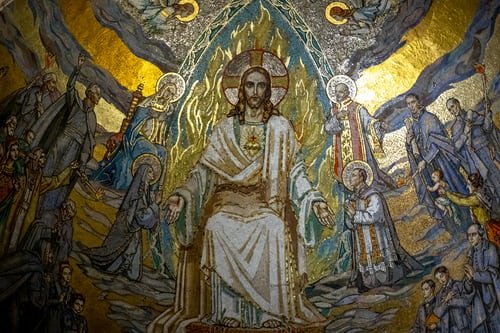Discover the Significance of Each Day in the Holy Week Timeline: A Beginner’s Guide to Christianity
Welcome to the Holy Week timeline, a journey through the events leading up to the crucifixion and resurrection of Jesus Christ. For those new to Christianity, Holy Week is a significant time for reflection and observation for believers around the world.

Throughout this timeline, we will explore the major events of Holy Week, including Palm Sunday, Holy Thursday, Good Friday, and Easter Sunday. Each day holds special significance, ultimately leading to the miracle of Easter and the hope it offers believers.
If you`re curious about learning more about Christianity and the importance of Holy Week, then join us on this journey of understanding and faith. Let`s dive in!
An Introduction to Holy Week and Its Significance in Christianity.

Holy Week is a significant time for Christians around the world as it marks the final week of Jesus Christ’s life on earth. This week-long observance begins with Palm Sunday, where crowds welcomed Jesus into Jerusalem by waving palm branches and shouting “Hosanna!”
As we move through Holy Week, each day holds particular significance in the Christian faith. For example, Maundy Thursday commemorates the Last Supper that Jesus shared with his disciples before he was betrayed by Judas Iscariot and arrested.
Good Friday is perhaps one of the most solemn days in Christianity as it marks Jesus’ crucifixion and death on a Roman cross. However, this day also serves as a reminder of God’s immense love for humanity – so much so that he sent his only Son to die for our sins.
Finally, Holy Saturday represents a time of reflection and anticipation before Easter Sunday arrives when Christians celebrate Christ’s resurrection from death three days after his crucifixion.
The significance of Holy Week lies not just in its historical importance but also in how it calls us to reflect upon our own lives. As we journey through this sacred week each year, we’re reminded to examine ourselves more closely – what have we done wrong? What can be improved? How can we live more fully according to God’s will?
In conclusion, while Holy Week may seem like just another religious holiday at first glance; It holds great spiritual value not only within Christianity but also beyond religion itself – calling all people towards introspection & personal growth towards living their best selves!
On Palm Sunday, Jesus made a triumphal entry into Jerusalem.
Palm Sunday marks the triumphant entry of Jesus into Jerusalem, an event that holds significant meaning for Christians around the world. As we approach Holy Week, it is important to understand the historical context and symbolism behind this momentous occasion.
According to biblical accounts, Jesus rode into Jerusalem on a donkey while crowds of people waved palm branches and shouted “Hosanna!” This was seen as a fulfillment of Old Testament prophecy regarding the arrival of a Messiah who would save God’s chosen people.
But beyond its prophetic significance, Palm Sunday also carries profound spiritual meaning for Christians. It serves as a reminder that Jesus came not just to be worshipped as king but also to serve and give his life for others.
As we reflect on Palm Sunday this year, let us remember its message of humility and service. Let us strive to follow in Christ’s footsteps by putting others before ourselves and spreading love wherever we go. May this Holy Week be one filled with blessings and renewed faith in our Lord Savior!
On Holy Thursday, Jesus had the Last Supper and washed the disciples’ feet.

Holy Thursday, also known as Maundy Thursday, marks the beginning of the Easter Triduum and is one of the most significant days in Christianity. It commemorates two important events: The Last Supper and Jesus washing the disciples’ feet.
During The Last Supper, Jesus gathered with his disciples for a final meal before his crucifixion. He broke bread and gave it to them saying, “This is my body which is given for you. Do this in remembrance of me.” He then took a cup filled with wine and said, “This cup that is poured out for you is the new covenant in my blood.
These words are still echoed today during Holy Communion services all over the world.
But that wasn’t all that happened on Holy Thursday. During dinner, Jesus performed an act of humility by washing his disciple’s feet – something typically done by servants or slaves at that time.
When Peter objected to this gesture at first because he felt unworthy of having his master wash his feet ,Jesus explained,”If I do not wash your feet,you can have no part with me.”
By humbling himself before them,Jesus was setting an example about love,sacrifice,selflessness,and service.He said,”I have set you an example so that you should do as I have done for yourselves”.
Even though we may not physically wash each other’s feet nowadays,the message behind it remains relevant.Whoever wants to be great among us,must become our servant just like how Christ showed us what true servanthood looks like on Holy Thursday.Instead,I challenge everyone who reads this article section,to consider ways they can serve their fellow human beings whole-heartedly whether through volunteering,donating,forgiving or simply lending a listening ear.We should always remember what Christ did on Holy thursday;He put others first even if it meant laying down His life
Good Friday commemorates the crucifixion of Jesus Christ.
Good Friday: The Crucifixion of Jesus Christ
Good Friday is a solemn day for Christians around the world as it commemorates the crucifixion of Jesus Christ. According to the Holy Bible, on this day, Jesus was betrayed by one of his disciples and arrested by Roman soldiers. He was then condemned to death by Pontius Pilate and forced to carry his own cross before being nailed to it.
The crucifixion event holds great significance in Christianity as it symbolizes Christ’s sacrifice for humanity’s sins. It serves as a reminder that through His death and resurrection, believers can attain eternal life.

As we reflect on this holy event, we are reminded that even in our darkest moments, there is hope because God sent His Son into the world to save us from sin and death. We can also draw lessons from Christ’s suffering – endurance during trials and steadfast faith in God despite challenging circumstances.
In observance of Good Friday, many churches hold special services where attendees participate in prayers or read passages from scripture recounting events leading up to Jesus’ crucifixion. Some people fast or engage in acts of service as a way of reflection or penance.
Despite its somber nature, Good Friday reminds us that there is always hope amidst despair – just like how after three days following His death on the cross came Resurrection Sunday when He rose again from the dead- proving once again that love conquers all things including sin!
On Easter Sunday, the resurrection of Jesus and its importance in the Christian faith are celebrated.
Easter Sunday is the most important celebration in the Christian faith, marking the resurrection of Jesus Christ from the dead. This event is considered to be a pivotal moment in history that has significance not only for Christians but for all humanity.
The story of Easter Sunday begins with Holy Week, which commemorates Jesus’ journey to Jerusalem and his ultimate sacrifice on the cross. On Good Friday, Jesus was crucified and buried in a tomb. However, on Easter Sunday morning, his followers discovered that he had risen from the dead.

For Christians, this event represents hope and new life. It signifies that death does not have the final word and that through faith in Christ’s resurrection we too can experience eternal life.
Beyond its spiritual importance, Easter also has cultural significance around the world. Many countries celebrate with traditions like egg hunts or special foods like hot cross buns.
As we reflect on this momentous occasion during Holy Week leading up to Easter Sunday each year as Christians it is important to remember its impact on our lives today—both personally and collectively as part of a global community striving towards peace and love for one another regardless of belief systems or backgrounds – so let us all come together this season filled with joyous gratitude!
Conclusion
Holy Week is a time of celebration and remembrance for Christians throughout the world. By exploring its significance, we can gain a greater understanding of the events that organized our faith and what it means to celebrate Jesus’ life and death. If you’re interested in learning more about Christianity or developing your own spiritual journey, please reach out to us at your local church!
















